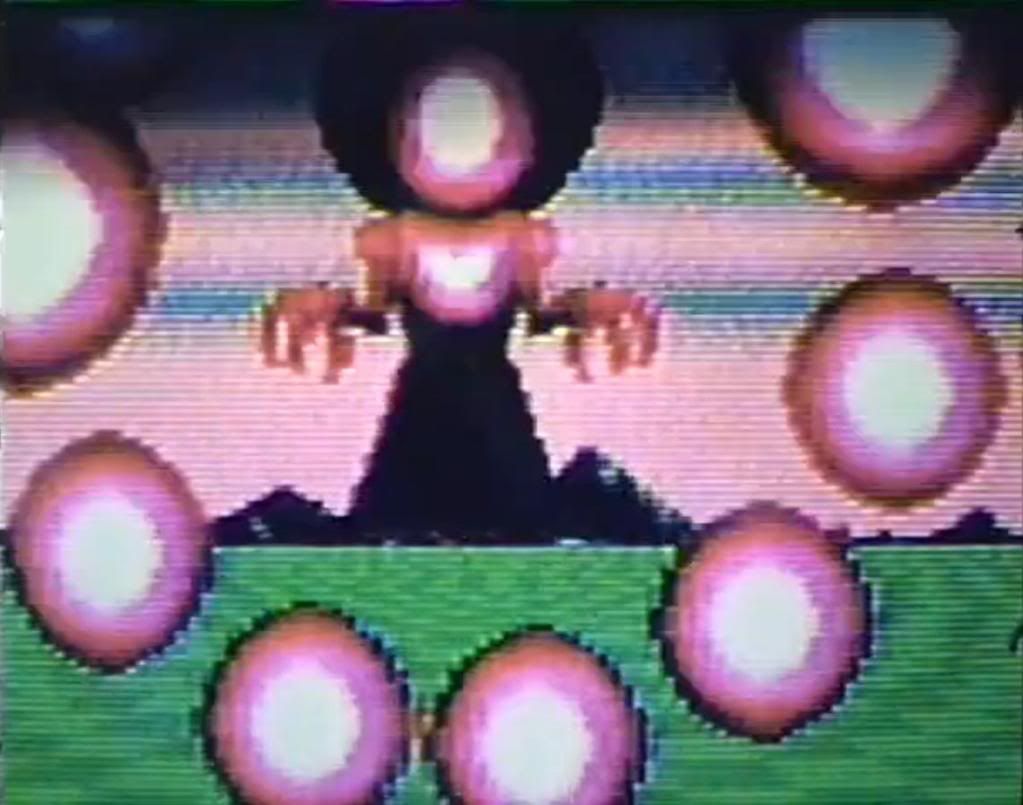
Welcome to my annual week of year-end lists. As usual, my film list is not at all up-to-date on current releases, and instead lists the best films I saw for the first time during 2012, regardless of when they were released. It's been a busy year for many reasons, the best of which is that in June, my wife and I had a baby girl, our first. As a result, this blog hasn't been a big focus for me, and much of my writing in the second half of the year was published from an archive of stored-up reviews. The pace around here is likely to continue slowing down, but that doesn't mean that I don't still enjoy writing about movies or interacting with all the wonderful people I've met in the film blogosphere. Thanks to everyone who's been reading, and my apologies if I haven't been around to respond to comments or comment on other blogs as much as I would like to.
Below is my list of favorites from the year in film, in alphabetical order and accompanied by excerpts from my reviews. My more traditional music list (which is limited to 2012 releases) will appear on Wednesday.
And We All Shine On (Michael Robinson, 2006) - "There's a powerful idea lurking in the current obsession with the retro and the nostalgic, and Robinson cuts to the core of it: the media of previous generations is so weighted with emotional import and meaning that exists almost entirely outside of the media itself, in the minds and memories of those who experienced it when it was fresh. Thus Robinson is trying to make these things new again, to recreate the sense of danger and mystery and strangeness that accrues to something that's new. He's delving into nostalgia to find the monsters lurking there, but rather than rendering them harmless through the filter of fond remembrance, he's trying to capture them in all their fearsome, memory-distorted glory, not as collections of pixels but as blurry figments of fevered childhood imagination."
The Castaways of Turtle Island (Jacques Rozier, 1976) - "[A] manic parody of the touristic impulse, explicitly connecting this kind of exotic Western tourism to the evils of colonialism... The film is a prolonged reductio ad absurdum in which Rozier ceaselessly mocks these clueless urban Westerners who have romanticized the exotic islands of the Caribbean and decided that they want what they think will be a glamorously 'authentic' tropical adventure."
Certified Copy (Abbas Kiarostami, 2010) - "In that sense, none of this is 'authentic' — it's acting, a performance — and yet all of it is, because when a viewer is watching a movie, he or she is always aware on some level that it's not 'real,' and yet movies are still capable of sweeping audiences up in emotional narratives, producing empathetic reactions from the fakery of actors. This has often been a focus of Kiarostami's work, and though on its surface Certified Copy does not deal with the documentary/fiction dichotomy that has so often been playfully tweaked and subverted in the director's oeuvre, these concerns are still implicit in the film's thematic subtext."
City Girl (F.W. Murnau, 1930) - "Murnau's images are loaded with drama, particularly in the way in which he frames taut two-shots in which the characters' poses are infused with their conflicted emotions. The images of Kate and Lem together, especially, are charged with their new, passionate, but fractured relationship — their postures simultaneously suggest intimacy and disconnection, as though they're both desperately pushing towards each other and pulling away, their intimacy polluted by the differences in their backgrounds and origins."
 Demonlover (Olivier Assayas, 2002) - "This is a frightening film, a work of unsettling sci-fi that barely feels like sci-fi because the future world it depicts is maybe just a few steps ahead of our own... Assayas is suggesting that this ruthless corporate ethic is at the root of the dehumanizing culture on display in this film. And the participants treat it like a game, destroying one another to get to the top, where really they've only been set up as the next target for those below them. The film is an unforgettable satire of a globalist corporate culture that seems determined to turn people into video game characters or doll-like mannequins, just more grist for the pop culture machine."
Demonlover (Olivier Assayas, 2002) - "This is a frightening film, a work of unsettling sci-fi that barely feels like sci-fi because the future world it depicts is maybe just a few steps ahead of our own... Assayas is suggesting that this ruthless corporate ethic is at the root of the dehumanizing culture on display in this film. And the participants treat it like a game, destroying one another to get to the top, where really they've only been set up as the next target for those below them. The film is an unforgettable satire of a globalist corporate culture that seems determined to turn people into video game characters or doll-like mannequins, just more grist for the pop culture machine."The Draughtsman's Contract (Peter Greenaway, 1982) - "Language is very important to this film, which boasts a marvelously clever script by Greenaway in which every word, every circumspect and torturously polite turn of phrase, disguises some secondary meaning, often a naughty bit of sexual double entendre — lots of appreciative banter about fruit, ripeness, fecundity, and 'the maturing delights of her country garden' — or a sly insinuation about someone or other's reputation, or a threat so carefully hidden in banal chit-chat and freighted symbols that its more sinister meaning might utterly pass over the head of the one being threatened."
The Freethinker (Peter Watkins, 1994) - "The Freethinker is continually... blending biography, literary criticism, sociopolitical commentary and media analysis. It's an amazing film that reflects Watkins' ideas about media hegemony and its connections to class imbalance, but most importantly its polemics are integrated into a larger whole that also wrestles with the nature of art and the relationship between the individual and his or her historical and social context. Even its cooperative production seeps into the film, providing an example of an alternative media model that skirts around the corporate mass media that currently dominates the distribution of information."
I Know Where I'm Going! (Michael Powell & Emeric Pressburger, 1945) - "This is a delightful romance of the Scottish isles, totally charming and sweet, shot with an eye for the natural poetry of the land, the beauty of sea and sky even in their darkest, most threatening moments."
La Chienne (Jean Renoir, 1931) - "What's great about the film is the somewhat haphazard unpredictability of its plotting and its juggling of tones. It's a twisty film where the reversals and ironies are anything but cheap, but instead provide bitter commentary on the follies of the characters and the society in which they live."
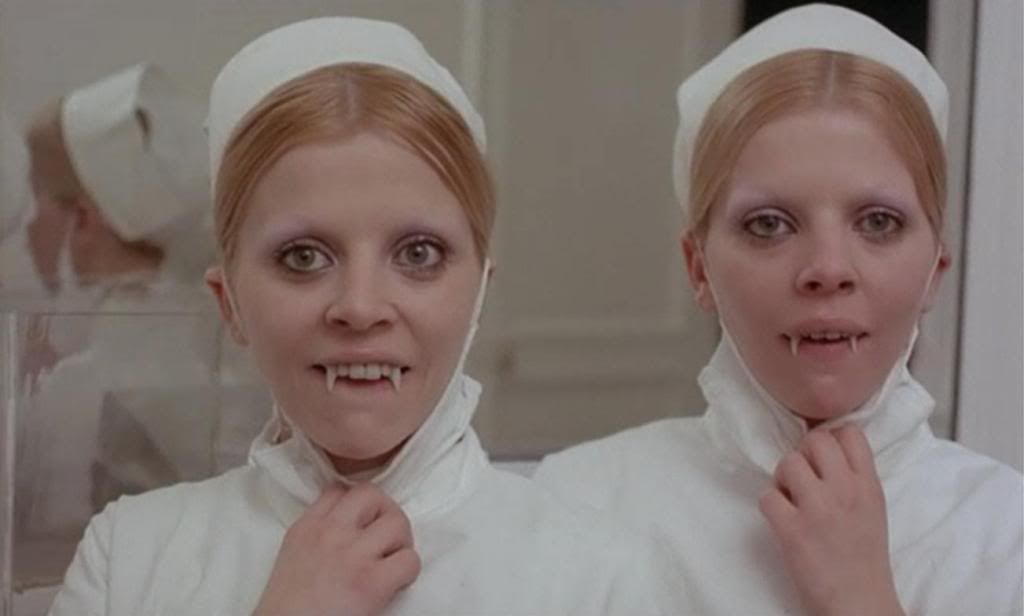 Lips of Blood (Jean Rollin, 1975) - "The film moves at a typically lethargic, dreamlike pace, blending gothic horror imagery — bats and graveyards and vampire girls clad in gauzy robes — with a weird conspiracy thriller vibe... Rollin's films have often been comparable to the surreal quest narratives of his contemporary Jacques Rivette, with worse acting and more nudity, and nowhere is that comparison more relevant than here. Rollin renders the city as a quiet, nearly unpopulated stage, pools of colored light highlighted in the darkness, shadows cast large and threatening on stone walls as Frederic wanders around the city, searching for answers and chasing phantoms through the streets."
Lips of Blood (Jean Rollin, 1975) - "The film moves at a typically lethargic, dreamlike pace, blending gothic horror imagery — bats and graveyards and vampire girls clad in gauzy robes — with a weird conspiracy thriller vibe... Rollin's films have often been comparable to the surreal quest narratives of his contemporary Jacques Rivette, with worse acting and more nudity, and nowhere is that comparison more relevant than here. Rollin renders the city as a quiet, nearly unpopulated stage, pools of colored light highlighted in the darkness, shadows cast large and threatening on stone walls as Frederic wanders around the city, searching for answers and chasing phantoms through the streets."The Man From London (Béla Tarr, 2007) - "The films of Béla Tarr have always been haunted by film noir to one degree or another. Tarr's downtrodden characters plod miserably through gloomy, shadowy wastelands, getting tangled up in plots and intrigues that briefly distract them from the otherwise unchanging stasis of their lives. In The Man From London... the influence of noir is as overt as it's ever been in Tarr's work, but tellingly it is not a drastic departure from the rest of his oeuvre, only a slight shift in emphasis that brings these subcurrents to the surface."
Midnight In Paris (Woody Allen, 2011) - "[W]e always yearn for an ideal past that we never experienced and that never really existed. Such desires are an escape, an outlet for anxieties about the present, rooted in the inescapable feeling that if only one had been born earlier, or elsewhere, everything would feel so much more right. Woody realizes that this is a somewhat misguided desire but he can't help feeling it anyway, and he lovingly depicts 1920s Paris as a beautiful, perfect, charming place, even while gently nudging Gil towards the realization that the past can't offer solutions for the problems of the present."
Napoléon (Abel Gance, 1927) - "It is certainly one of the most innovative films of the silent era, with Gance restlessly inventing and combining multiple techniques, pouring everything into the film. Even before the famous climactic final reel, for which Gance created a widescreen three-camera shooting technique he called Polyvision, the film is a virtual catalog of everything that was possible in the silent cinema, and probably at least a few things that weren't possible before Gance. The camera shakes and sways, freed from static framings, and the film's approach to montage, controlling pacing by periodically building up to bursts of frenzied cutting and layered multiple exposures, is practically modern."
Pandora's Box (Georg Wilhelm Pabst, 1929) - "[Louise] Brooks' Lulu is a woman in trouble, a troubled woman, or maybe just trouble, but there's no question that she's utterly mesmerizing to watch, and Pabst perfectly captures her luminous qualities. The film's melodramatic narrative, which puts Lulu through a series of increasingly demeaning tragedies, is balanced by the combination of realism and stylized glamour in Pabst's aesthetic, making this one of the great collaborations between a director and an actress.
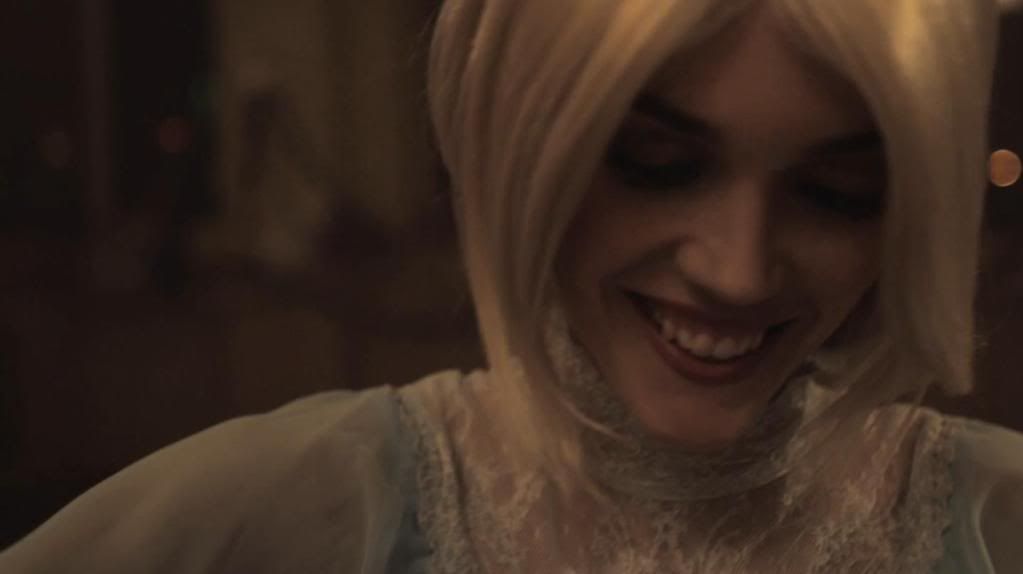 Prom Night (Celia Rowlson-Hall, 2010) - "These fluid transformations suggest that Rowlson-Hall is enacting various archetypes and stereotypes of femininity, embodying alternately the demure hometown girl, the untouchable symbol of spiritual purity, the Pamela Anderson sex kitten, the lollipop-sucking Lolita, Madonna with her infamous cone bra... Rowlson-Hall is delving subtly into the many different meanings of the prom in American culture: as a locus of sexuality, as a stage for enactments of gender roles, as a repository for memories of adolescence, as a last ritual of the teen years before the transition into adulthood."
Prom Night (Celia Rowlson-Hall, 2010) - "These fluid transformations suggest that Rowlson-Hall is enacting various archetypes and stereotypes of femininity, embodying alternately the demure hometown girl, the untouchable symbol of spiritual purity, the Pamela Anderson sex kitten, the lollipop-sucking Lolita, Madonna with her infamous cone bra... Rowlson-Hall is delving subtly into the many different meanings of the prom in American culture: as a locus of sexuality, as a stage for enactments of gender roles, as a repository for memories of adolescence, as a last ritual of the teen years before the transition into adulthood."Providence (Alain Resnais, 1977) - "Editing is the key to the cinema of Alain Resnais, the crux of his work. Through the cut, the filmmaker controls the flow of space and time, controlling what's seen and not seen, where a scene starts and where it ends, and few other directors have made this truism so explicit in their art. For Resnais, this process has often been a cinematic analogue for the workings of memory, for the self-editing capacity of the human mind."
The Red and the White (Miklós Jancsó, 1967) - "Jancsó captures the fragmentation and absurdity of war in every moment of his film, alternating between long periods of stasis and confused bursts of violence in which it's seldom clear which side is which or who's winning... The wide frame de-emphasizes any individuals: there are very few characters who survive more than a few minutes onscreen, and even when one of the soldiers momentarily steps into the foreground of the frame for an ad-hoc closeup, inevitably he's dead or melted back into the general clamor a few moments later."
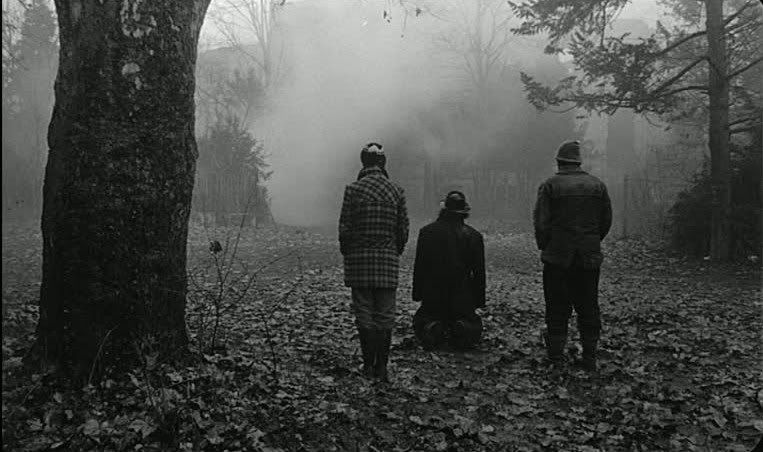 Sátántangó (Béla Tarr, 1994) - "'We relate to it as twigs to the rain: we cannot defend ourselves.' That's the essence of Tarr's perspective on time, this relentless forward flow that cannot be paused or halted, that is always charging onward regardless of what's happening in any individual life. The emphasis on the passage of time is so essential because one of Tarr's key themes here is stagnation: time passes, and yet nothing happens, everything remains the same, the people of this town continue to wallow in misery and boredom, to simply pass the time."
Sátántangó (Béla Tarr, 1994) - "'We relate to it as twigs to the rain: we cannot defend ourselves.' That's the essence of Tarr's perspective on time, this relentless forward flow that cannot be paused or halted, that is always charging onward regardless of what's happening in any individual life. The emphasis on the passage of time is so essential because one of Tarr's key themes here is stagnation: time passes, and yet nothing happens, everything remains the same, the people of this town continue to wallow in misery and boredom, to simply pass the time."The Sleeping Beauty (Catherine Breillat, 2010) - "The film's style is both magical and direct, with crisp cinematography that makes these glistening fairy tale locales seem quotidian and grounded... In one stunning sequence, Anastasia rides a reindeer into the arctic wilds to find an old crone who controls the winds, and the snowy landscapes stretch across the screen, the Northern Lights explosively filling the sky, with the princess a fuzzy little smear in her pink coat, lost and alone in this beautiful but deadly land."
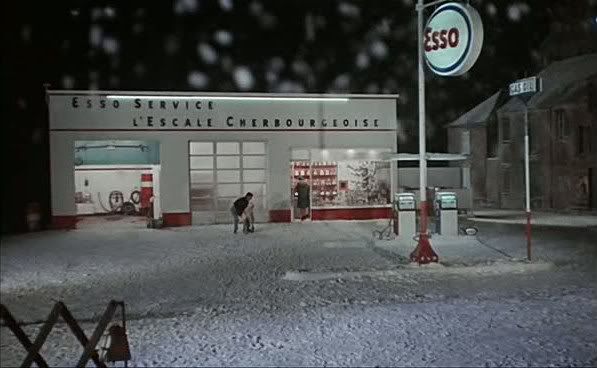 The Umbrellas of Cherbourg (Jacques Demy, 1964) - "She'd imagined that life would be like a melodrama, that she couldn't live without her lover, but she finds that in reality, unlike the movies, memories can fade, life can go on, and there are endings that aren't quite happy, but aren't quite unhappy either, that the sadness and the pleasure of life can be tangled and intertwined so completely that it's difficult to separate one from the other."
The Umbrellas of Cherbourg (Jacques Demy, 1964) - "She'd imagined that life would be like a melodrama, that she couldn't live without her lover, but she finds that in reality, unlike the movies, memories can fade, life can go on, and there are endings that aren't quite happy, but aren't quite unhappy either, that the sadness and the pleasure of life can be tangled and intertwined so completely that it's difficult to separate one from the other."Under Capricorn (Alfred Hitchcock, 1949) - "Hitchcock's Under Capricorn is one of the director's more divisive films, but it certainly doesn't deserve its unflattering reputation. This lavish period melodrama, set in 1800s Australia, might be deliberately paced, but it's as emotionally, psychologically and formally complex as any of the director's best work."
Vampyr (Carl Theodor Dreyer, 1932) - "It's a surreal and haunting experience, a rather indirect horror movie in which its atmosphere of fear arises from what's not seen rather than what's seen... A farmer with a scythe rings a bell, an ominous tolling that seems to forebode grave events in the offing. Shadows are disconnected from any physical bodies, passing along walls without any sign of who might be casting the shadow. A reflection of a child runs, upside-down, along the surface of a pond, with no corresponding figure upon the shore who could be creating this reflection."

9 comments:
Great list. Half filled with films I really love and the rest alluring recommendations I can't wait to get to. Perfect.
Thanks, Charulata!
Ed, congrats on the baby girl! I was wondering why you seemed quiet in the blogosphere, but that's more than understandable.
As for the list, it's great to see the two Tarr films, the Kiarostami, and the Breillat (though I preferred Bluebeard to TSB). Like you, The Freethinker was one of my discoveries of 2012, and it's a fairly fascinating experiment, if not quite the feat of invention of some of Watkins' other work, particularly Edvard Munch.
It's interesting that you haven't seen Vampyr until now. That's really an extraordinary movie. I saw it in LA in the fall with a live ambient accompaniment by Steven Severin (you can read about my experience here), and that was one of my favorite screenings of the year.
Looking forward to reading and discussing your music picks!
Thanks, Carson. Watkins is a favorite of mine too, and while nothing really touches Edvard Munch, he's great in general and The Freethinker is really rich and totally original.
I love both of those Breillat fairy tale movies, and could easily have put both on here. Bluebeard is great. She represents easily the biggest flip in estimation that I've ever experienced with an artist; I'm pretty ambivalent about much of her earlier work but totally love her last few features.
I remember hearing about that Vampyr screening (maybe from you) and thought it was curious to do a live score for a sound film, even a sound film as quiet as this one. Still, sounds like an interesting experiment. And Vampyr blew me away and had me kicking myself for not getting around to it earlier.
It is a special thrill to see your list contain two films by Bela Tarr in the year when I have declared his THE TURIN HORSE as the #1 film. I have since watched THE MAN FROM LONDON, and have fully come to embrace your brilliant assessment. Not of course that I am at all surprised, in view of my highest regard for this artist and the staggering greatness of his SATANTANGO, where you offered up one of your finest reviews on this blog during the calendar year. Your work on the cinema of Jean Rollin is peerless, as can be seeing by your work with LIPS and with the recently-reviewed FASCINATION. I was further delighted that you fully embraced Demy's THE UMBRELLAS OF CHERBOURG, one of the greatest of all musicals. And nice to know I have an accomplice with LA CHIENNE, the Renoir that rates ahead of it's Fritz Lang re-make SCARLET STREET. The towering NAPOLEON by Abel Gance also received superlative analysis on these pages, as did Jansco's THE RED AND THE WHITE, Dreyer's VAMPYR, Murnau's underrated CITY GIRL and further exploration of that wonderful eclectic British director Peter Greenaway. To be sure I also applaud the inclusions here of CERTIFIED COPY, I KNOW WHERE I'M GOING and PANDORA'S BOX. I wasn't a fan of Woody's MIDNIGHT IN PARIS, yet loved TO ROME WITH LOVE, a dual conviction that nearly gained me admission to Greystone.
Anyway, great, great round-up, and you deserve all the credit for keeping things active at this incomparable blog which family matters must and should take full precedence.
Amazing list.
I just saw City Girl, I think the day before you posted this. It was overwhelmingly good, and reminded me quite a lot of The Wind.
You have reminded me that I must get more Bela Tarr into my life, stat.
Sam, I still have to get around to The Turin Horse myself but I'm looking forward to it. Tarr is always a special treat.
Getting to know Rollin's work this year was one of my favorite surprises; I never expected to love his films as much as I did.
And you know I'm totally with you on the Demy and the others.
Thanks, Stacia. Glad you loved City Girl as much as I did, it's my favorite Murnau. So poignant and sweet and sad and beautiful.
Major congrats on the new addition to the Howard family. Some great picks here and also some great "pics" - wonderful screen-caps from Umbrellas in particular, but they're all pretty enchanting. The Freethinker sounds intriguing. Somewhat random aside (although it seems vaguely similar in its concerns), but have you seen John Berger's 1970s BBC program Ways for Seeing? It's on YouTube, not terribly long, and I think you might really dig it. It was certainly one of my most cherished discoveries of 2012.
Post a Comment